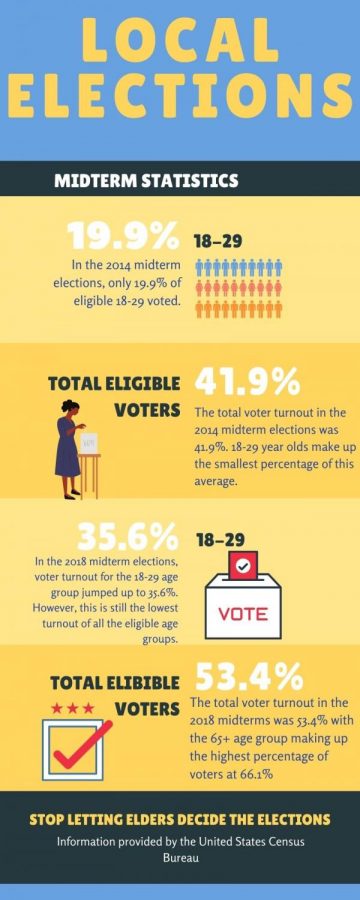The importance of local elections
How each position affects our daily lives
information provided by the United States Census Bureau
This infographic shares the percentage of young voters in the past midterm elections compared to the overall percentage of the average voter turnout.
October 8, 2020
It is a common misconception that important elections take place only every two to four years. While it is essential to vote in national elections, local elections take place every year and affect parts of our everyday lives as well. From schools to roads, local politicians make decisions that affect local businesses and infrastructure.
Young people are flocking towards what CNBC refers to as “millennial boomtowns” for better wages and job opportunities. With more and more young people moving to cities, they have the power to create massive changes to their local governments. However, Millennials and Generation-Z remain hesitant to hit the polls. In the 2014 midterm elections, only 19.9% of eligible voters aged 18-29 showed up to vote according to the United States Census Bureau. This number jumped up to 35.6% in 2018, but that is still not enough to promote change.
While presidential elections can determine laws and policies for the nation, positions such as mayors, city council members and school board members help to decide local policies. Although each city can choose a different governmental structure, each position can be broken down into executive, legislative or judicial.
The president acts as the executive of the nation much like mayors or city managers act as the executive of cities. Mayors are in charge of appointing and dismissing key department heads as well as creating a yearly budget to present to the council members. They also help to decide policies about everyday issues such as land usage, transportation and housing. Some cities have city managers which are appointed by the city council rather than elected by the people.
Members elected to the city council have the final say in both laws passed and budgets created by the mayor. They respond to the mayor’s proposals as well as developing proposals of their own. While a mayor may have more power than an individual councilman, a council majority can help to override a policy suggested by the mayor.
The county executive and the county commissioner help with issues affecting an entire county. County and city revenue sources may differ, so the commissioner and executive can help to create parallels between the two budgets. Some larger areas may combine city and county governments into one singular unit.
District attorneys are the chief law enforcers for communities. A district attorney has the authority to bring issues to trial, make sentencing recommendations and prosecute criminal offences as well as lowering the priority of prosecution for certain offenses. With the current Black Lives Matter movement and more attention towards police brutality, electing district attorneys this year will be more imperative than ever, considering that they can address misconduct and work to reform the criminal justice system.
High school seniors who are eligible to vote in the upcoming local elections might be interested in the school board candidates. The school board serves as a link between the community and the classroom. Candidates selected for school board directly affect every K-12 student in a district. The members decide the curriculum taught, the funding for different programs and the time school begins and ends. For voting high school students, these candidates will set the policies for peers.
In 2018, the voter turnout for the Nebraska midterm elections was the highest since 1994 at 56% according to the Omaha World Herald. While this is a leap in the right direction, this is hardly a large enough turnout to spark any major waves. Although many citizens are occupied with trying to decide which presidential candidate has their vote, everyone should be researching the policies of local politicians as well. Some may not think their vote has much of an impact on anything, but in local elections one vote can be the path towards a change in the community.







